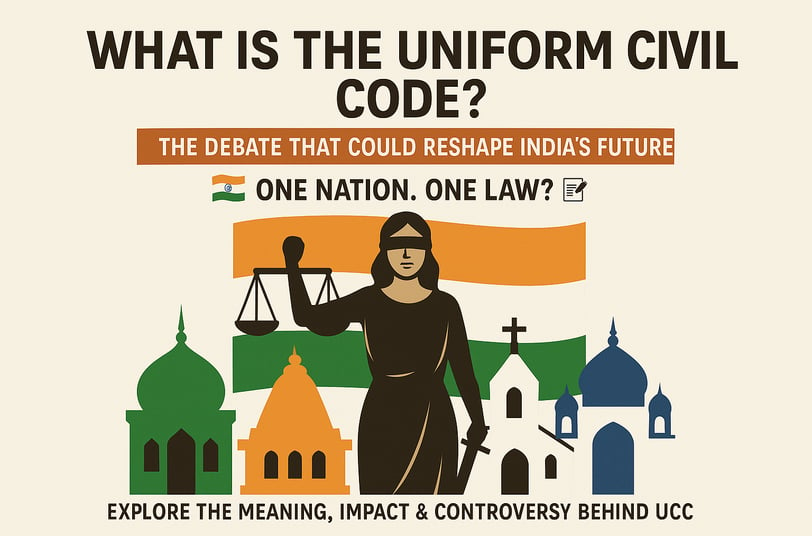What Is Uniform Civil Code? The Debate That Could Reshape India's Future
A national discussion that has the potential to redefine justice for all Indian citizens.
Avinash Jaiswal
4/11/2025


Introduction to the Uniform Civil Code (UCC):
The Uniform Civil Code (UCC) is one of the most debated and controversial topics in Indian constitutional law and public policy. Envisioned under Article 44 of the Indian Constitution, the UCC aims to replace personal laws based on the scriptures and customs of each major religious community in India with a common set governing every citizen. The goal is to promote uniformity in civil matters such as marriage, divorce, inheritance, and adoption, ensuring equality before law irrespective of religion, caste, or gender.
Historical Context of UCC in India:
The origin of the Uniform Civil Code can be traced back to the colonial era, when the British administration codified criminal laws but left personal laws untouched to avoid opposition from religious groups. After independence, Dr. B.R. Ambedkar, the architect of the Indian Constitution, strongly advocated for a uniform code, but due to intense resistance, it was relegated to the Directive Principles of State Policy in Article 44, which are non-enforceable in a court of law.
Since then, the UCC has resurfaced repeatedly in public discourse, especially during significant court rulings and election campaigns. However, no government has been able to implement it fully due to its politically sensitive nature.
Why Is the Uniform Civil Code Important?
1. Equality Before Law
Currently, different religious communities in India follow different personal laws. For example:
Hindus follow the Hindu Marriage Act, 1955.
Muslims adhere to Shariat law, primarily governed by the Muslim Personal Law (Shariat) Application Act, 1937.
Christians are regulated by the Indian Christian Marriage Act, 1872 and Divorce Act, 1869.
This fragmented system creates legal inequalities, especially in areas like women’s rights, inheritance laws, and divorce proceedings. The UCC seeks to ensure that all citizens, regardless of religion, are governed by the same set of secular laws, thus promoting real secularism and gender justice.
2. Promoting National Integration
A common civil code would create a sense of unity and oneness among diverse communities. It could help in reducing communalism, curbing vote-bank politics, and promoting national harmony by treating every citizen equally in the eyes of the law.
3. Simplifying the Legal System
With multiple personal laws in operation, the legal process becomes complicated, often leading to conflicting judgments. A uniform law would reduce legal ambiguity, streamline civil proceedings, and make justice more accessible.
Arguments in Favor of UCC
Gender Justice: Women, particularly from minority communities, often suffer due to regressive personal laws. The UCC could eliminate discriminatory practices like triple talaq, polygamy, or unequal inheritance.
Secularism: True secularism does not mean appeasing any religion but treating all citizens equally under one law.
Modernization of Society: A uniform code will help India align with modern legal systems around the world and uphold constitutional values of equality and liberty.
Arguments Against UCC
Despite its advantages, several groups oppose the UCC. Their concerns include:
Violation of Religious Freedom: Critics argue that enforcing a uniform law violates Article 25, which guarantees the freedom to practice religion.
Cultural Sensitivity: India is a pluralistic society, and imposing uniformity may ignore the unique customs and traditions of different communities.
Fear of Majoritarianism: There is apprehension that the UCC may reflect Hindu cultural practices, marginalizing minority communities.
Supreme Court on Uniform Civil Code
The Supreme Court of India has, on multiple occasions, emphasized the need for a Uniform Civil Code:
In the Shah Bano case (1985), the Court upheld a Muslim woman’s right to maintenance and criticized the absence of a UCC.
In the Sarla Mudgal case (1995), the Court highlighted the misuse of religion to commit bigamy and urged the government to implement the UCC.
Recently, in Jose Paulo Coutinho v. Maria Luiza Valentina Pereira (2019), the Court appreciated Goa’s uniform civil code, calling it a shining example.
These judgments reiterate the judiciary’s consistent stance that UCC is essential for securing justice and equality.
Goa: The Only State with UCC
Goa remains the only Indian state that follows a Uniform Civil Code applicable to all its citizens, regardless of religion. The Portuguese Civil Code of 1867, retained post-liberation, is a single law governing marriage, divorce, succession, and adoption. Goa is often cited as proof that UCC is feasible and functional in India.
Recent Developments and Political Stance
The debate on UCC has intensified in recent years, with several state governments like Uttarakhand and Assam expressing intent to introduce their own version of the code. The Law Commission of India is also examining public opinions to draft a framework.
The Bharatiya Nyaya Sanhita, 2023, though focused on criminal law reforms, has reignited interest in broader legal restructuring, including civil laws. The UCC is now a core agenda in many political manifestos, and its implementation appears closer than ever.
Challenges to Implementation
Despite growing support, implementing UCC across India faces serious hurdles:
Resistance from religious groups
Political hesitancy due to vote-bank politics
Lack of consensus among legal experts
Complexity in harmonizing diverse customs
Hence, the path to a uniform civil framework requires extensive consultation, awareness campaigns, and phased implementation.
Conclusion: Is India Ready for UCC?
The Uniform Civil Code represents both a legal necessity and a social revolution. While it promises equality, secularism, and legal clarity, its execution must be sensitive to India's multicultural identity. For UCC to succeed, it must be crafted with inclusivity, protect religious freedom, and ensure gender justice without favoring any particular community.
As the nation debates, it is clear that UCC is not just a legal reform but a defining moment in India's democratic evolution
Contacts Us
+91 7068780290
vidyaplanetorg@gmail.com


